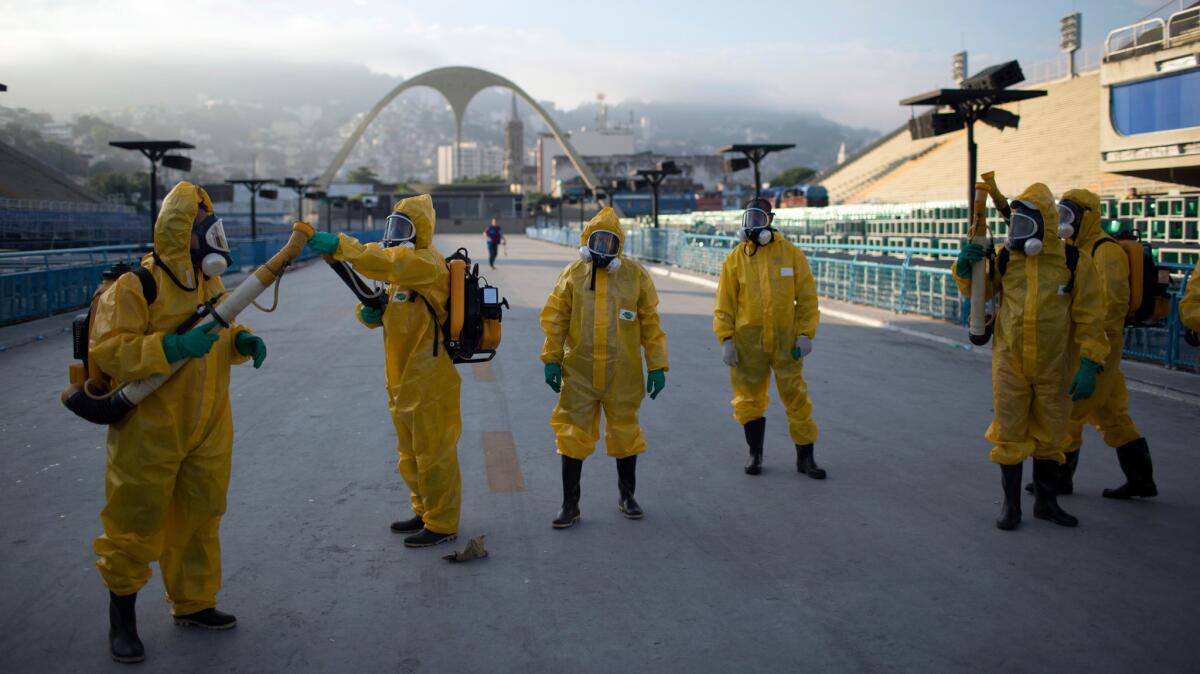Editorial: There’s no justification — yet — to delay the summer Olympic Games because of Zika

- Share via
Half a million people from more than 200 countries are expected to travel to Rio de Janeiro in August to take part in the summer Olympic Games. When they return home, it will be with mementos and memories from this extraordinary gathering of nations. Some, however, may also take home an unwelcome souvenir: the Zika virus.
It’s a likely enough scenario, given that Brazil is the epicenter of a strain of this mosquito-borne virus. Zika causes birth defects in babies born to women who were exposed while pregnant, and, in rare cases, it leads to neurological diseases in adults. And although Brazil has promised to eradicate the the Aedes aegypti mosquito that spreads the virus, it hasn’t done so yet, and transmissions continue. The disease can also be transmitted sexually.
An event that brings together people from every corner of the planet is a virus’ dream come true. But how serious are the risks really, and what can be done to reduce them? Could Zika transmissions during the Olympic Games appreciably speed up the spread of an already well-established epidemic? What will be the result of holding such a massive gathering at ground zero of an infectious disease that we still don’t know everything about? What about the fact that millions of international tourists also travel to Rio during the other 11 months of the year to lie on its beaches and participate in Carnival? How do Zika’s risks compare to those of other diseases, of food poisoning, of traffic accidents and local violence?
A group of international academics think the risk is too high to be allowed. More than 200 of them have signed an open letter to Margaret Chan, head of the World Health Organization, asking the organization’s support for postponing the games or moving the events to a Zika-free zone. Their fear is that this rare global event will speed the spread of the inevitable epidemic in countries without adequate public health resources.
These well-meaning academics – scientists, doctors, bioethicists and legal scholars mostly – are certainly an informed lot when it comes to public health issues, but they are not mostly experts on infectious diseases. They are not the folks who study emerging pathogens every day and balance the risks with the realities.
The World Health Organization, the U.S. Centers for Disease Control and Prevention and the National Institute of Allergy and Infectious Diseases, among others say the small Zika risk does not justify such an extreme response as putting off the start of the games.
That’s not just a guess. It’s based on past experience and logic: Olympic Games will account for just a fraction of the travel this year to places where the Zika epidemic is already raging. (In other words, the Zika ship has sailed.) Also, August is winter in Brazil, and cooler weather typically means fewer mosquitoes. Delaying the games until the warmer months doesn’t make sense.
And although Zika is not benign, it’s certainly no Ebola, which is transmitted easily from person to person and has a fatality rate that has ranged from 25% to 90% during various outbreaks. For people who are not pregnant, Zika is hardly more than an annoyance; the pain and the health risk to those who contract the infection are mild. Also, health officials believe a vaccine is imminent, possibly within the year.
For pregnant women, the situation is more serious. The WHO and CDC and other organizations are strongly advising pregnant women not travel to Brazil or other Zika hot spots until the epidemic is over. And they are warning anyone who travels to the games to refrain from unprotected sex for as long as eight weeks after returning home. That’s prudent. It would also be smart for international health officials to pressure Brazil and the International Olympic Committee to step up mosquito eradication programs over the next month, and to monitor progress closely.
It’s wise to have a healthy concern about this virus. But the risk doesn’t yet rise to the level of 1916, 1940 and 1944, the world war years that were the only other times the summer Olympic Games were cancelled.
Follow the Opinion section on Twitter @latimesopinion and Facebook
A cure for the common opinion
Get thought-provoking perspectives with our weekly newsletter.
You may occasionally receive promotional content from the Los Angeles Times.






